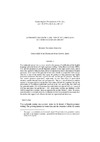Identificador persistente para citar o vincular este elemento:
https://accedacris.ulpgc.es/jspui/handle/10553/72675
| Título: | Authority in lowth's and priestley's prefaces to their English Grammars | Autores/as: | Fernández Martínez, Dolores | Clasificación UNESCO: | 5701 Lingüística aplicada | Fecha de publicación: | 2012 | Publicación seriada: | Studia Anglica Posnaniensia | Resumen: | The eighteenth century was a crucial period in the process of codification of the English language and in the history of English grammar writing (Tieken-Boon van Ostade 2008b). The need for grammars to provide linguistic guidance to the upper social classes, and to those who aspired to belong to them, led to an important increase in the output of English grammars. Since most of the grammar writers were clearly in competition with one another for a share of the market, they turned the prefaces to their grammars into highly persuasive instruments that tried to justify the need for that specific grammar. Priestley's and Lowth's grammars epitomized, respectively, the two main trends of grammatical tradition, namely descriptivism and prescriptivism. Taking a critical discourse analysis approach, this paper aims to examine how both writers claimed their authority through the presentation of the different individuals involved in the text, specifically, the author and any potential readers. We will examine how individuals are depicted both as a centre of structure and action through Martin's (1992) identification systems and Halliday's (2004 [1985]) transitivity structures. Such an approach fits in with Wicker's (2006: 79) assessment of prefaces as textual networks of authority in which it is essential to interrogate how the readers who support and influence the texts are represented and addressed. | URI: | https://accedacris.ulpgc.es/handle/10553/72675 | ISSN: | 0081-6272 | DOI: | 10.2478/v10121-012-0013-9 | Fuente: | Studia Anglica Posnaniensia [ISSN 0081-6272], v. 47 (4), p. 97-111 |
| Colección: | Artículos |
Citas SCOPUSTM
3
actualizado el 08-jun-2025
Visitas
232
actualizado el 09-ene-2026
Descargas
128
actualizado el 09-ene-2026
Google ScholarTM
Verifica
Altmetric
Comparte
Exporta metadatos
Los elementos en ULPGC accedaCRIS están protegidos por derechos de autor con todos los derechos reservados, a menos que se indique lo contrario.
